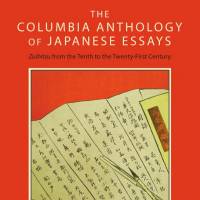Not exactly essays, not exactly poems, zuihitsu — a uniquely Japanese genre of literature — may be hard to define, but they are delightfully easy to read. "The Columbia Anthology of Japanese Essays," edited and translated by Steven D. Carter, presents a definitive collection of this genre, written between the 10th and 21st century. Each section of the collection is prefaced by a brief introduction, and thus provides excellent context for both the serious student unpacking Japanese literature and the couch-reader, languidly dipping into the wonderfully meandering style of the zuihitsu. Fittingly, Carter opens the collection with Sei Shonagon and Yoshida Kenko, who together "provided the foundation for a literary form that would live on until the present."
The Columbia Anthology of Japanese Essays, by Steven D. Carter.
Columbia University Press, Nonfiction.
The collection continues chronologically, taking readers through the witty, spiraling wisdom that characterizes zuihitsu as seen from various eras and writers from all walks of life. However, Carter's selections speak to the modern mind, revealing the humor and whimsical sagacity ever-present in this art form: "Life in this world, is a day of fuss and flurry, in a market stall — where beneath the evening sky, not a single soul remains," writes Shiba Kokan.
Savor a copy of "The Columbia Anthology of Japanese Essays," and take a contemplative walk through the Japanese mind, full of poetic turns and pithy longings, ribald humor and lofty aspirations.
Read archived reviews of Japanese classics at jtimes.jp/essential.



















With your current subscription plan you can comment on stories. However, before writing your first comment, please create a display name in the Profile section of your subscriber account page.